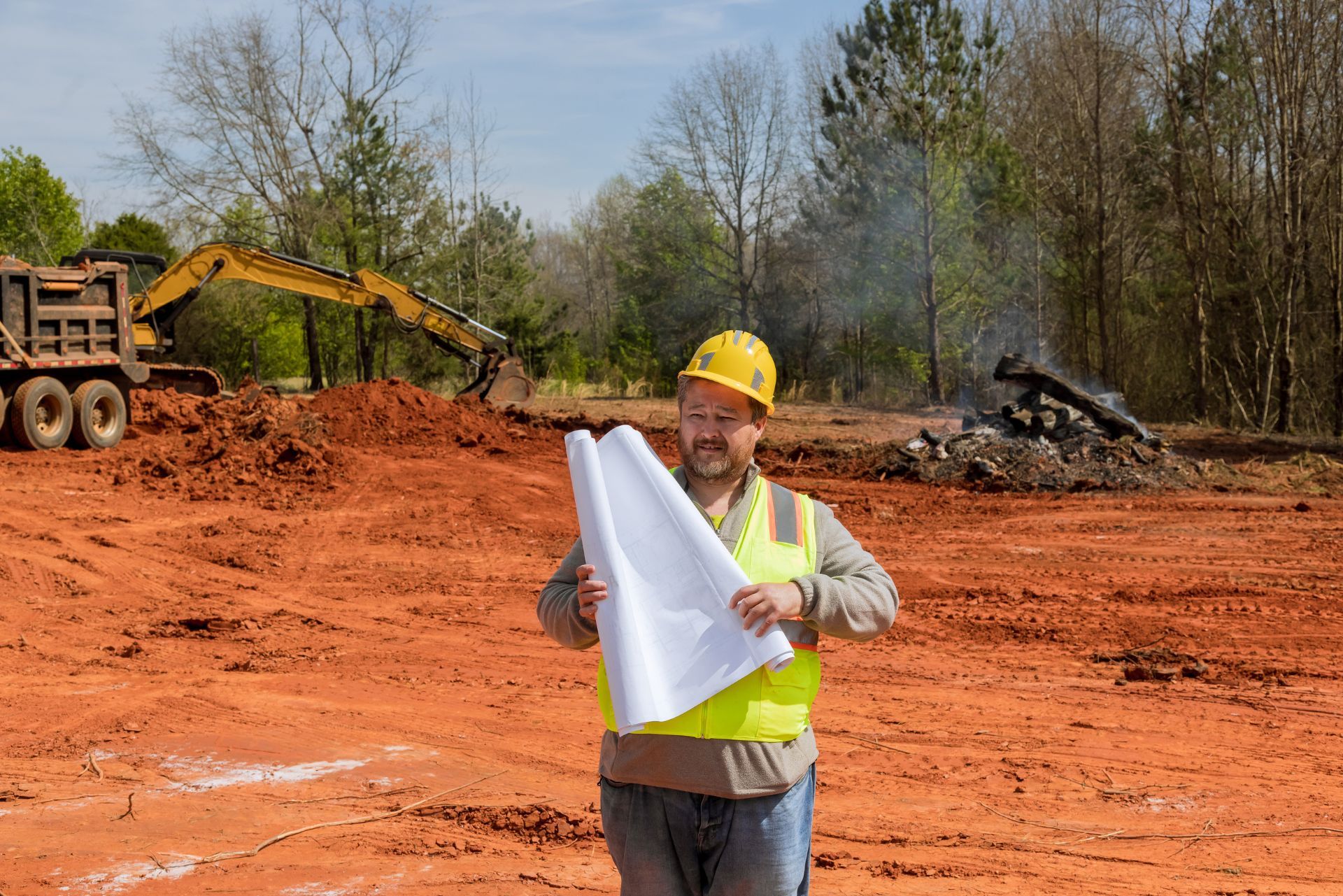South Carolina Excavation & Grading Contractor Insurance

9:00am - 5:00pm Mon-Fri
Will Reply in 15min*
Index
Contact Us
Phone
864-626-6181
service@southerninsured.com
Location
5 Century Drive Suite 130 Greenville, SC 29607
810 Dutch Square Boulevard, Suite 123 Columbia, SC 29210
For excavation and grading contractors in South Carolina, understanding the nuances of insurance is crucial. The construction industry is fraught with risks, from accidents on the job site to property damage and liability claims. This article delves into the essential aspects of excavation and grading contractor insurance, providing a comprehensive guide to help contractors navigate their insurance needs effectively.
Understanding Excavation and Grading Contractor Insurance
Excavation and grading contractor insurance is designed to protect businesses from various risks associated with construction work. This type of insurance typically includes several coverage options tailored to the unique needs of contractors in this field. Given the inherently hazardous nature of excavation and grading, having the right insurance coverage is not just a legal requirement in many areas, but also a crucial component of a contractor's risk management strategy.
Types of Coverage
There are several types of insurance coverage that excavation and grading contractors should consider. Each type serves a specific purpose and can provide vital protection against potential losses. Understanding these coverage options can help contractors make informed decisions that safeguard their business and employees.
- General Liability Insurance: This is the most fundamental type of insurance for contractors. It covers bodily injury, property damage, and personal injury claims that may arise during the course of business operations. Without this coverage, a single accident could lead to significant financial strain.
- Workers' Compensation Insurance: This insurance is essential for protecting employees who may get injured on the job. It covers medical expenses and lost wages, ensuring that workers are taken care of while also protecting the contractor from lawsuits related to workplace injuries. Additionally, having this insurance can foster a safer work environment, as it encourages contractors to prioritize employee safety.
- Commercial Auto Insurance: For contractors who use vehicles for business purposes, commercial auto insurance is necessary. It covers damages resulting from accidents involving company vehicles, including liability and physical damage to the vehicles. This coverage is crucial, especially for contractors who transport heavy equipment or materials to various job sites.
Importance of Specialized Coverage
In addition to general coverage, excavation and grading contractors may need specialized insurance options to address specific risks associated with their work. These specialized policies can provide additional layers of protection that are essential in a field where the stakes are high and the risks are varied.
- Equipment Insurance: Heavy machinery and equipment are often essential for excavation and grading tasks. Equipment insurance protects against loss or damage to these valuable assets, ensuring that operations can continue smoothly. Given the significant investment in machinery, this coverage can be a lifeline for contractors facing unexpected repairs or replacements.
- Professional Liability Insurance: This coverage is particularly important for contractors who provide design or consulting services. It protects against claims of negligence or failure to deliver services as promised. With the increasing complexity of excavation projects, having this insurance can help mitigate risks associated with design flaws or miscalculations.
- Pollution Liability Insurance: Given the nature of excavation work, there is a risk of environmental damage. Pollution liability insurance covers costs associated with pollution cleanup and legal claims resulting from environmental incidents. This coverage is becoming increasingly important as regulatory scrutiny intensifies, and contractors must be prepared for the potential financial repercussions of environmental mishaps.
Moreover, contractors should also be aware of the importance of reviewing their insurance policies regularly. As their business grows or changes, so too do the risks they face. Adjusting coverage limits and adding new types of insurance can help ensure that they remain adequately protected against emerging threats. Additionally, engaging with an insurance broker who specializes in construction can provide valuable insights into the most relevant coverage options tailored to specific operational needs.
Furthermore, understanding the claims process is crucial for contractors. In the event of an incident, knowing how to navigate the claims process can significantly impact the speed and efficiency with which they receive compensation for losses. Contractors should maintain detailed records of their operations, safety protocols, and any incidents that occur, as this documentation can be invaluable when filing a claim. By being proactive and informed, excavation and grading contractors can enhance their resilience against the unpredictable nature of their work.

Legal Requirements in South Carolina
Understanding the legal requirements for insurance in South Carolina is essential for excavation and grading contractors. The state has specific regulations that must be adhered to in order to operate legally and safely.
State Regulations
South Carolina does not mandate general liability insurance for contractors; however, it is highly recommended. Many clients and project owners will require contractors to carry this insurance as a condition of the contract. This type of insurance protects contractors from claims arising from accidents, injuries, or damages that occur during the course of their work, thus providing a safety net that can prevent financial ruin in the event of unforeseen incidents.
Workers' compensation insurance is required for all businesses with four or more employees. This requirement underscores the importance of protecting workers and the business itself from potential legal claims. In addition to covering medical expenses for employees injured on the job, workers' compensation can also provide wage replacement benefits, ensuring that workers are supported during their recovery. This not only fosters a safer work environment but also enhances the contractor's reputation as a responsible employer.
Licensing Requirements
In addition to insurance, excavation and grading contractors must obtain the appropriate licenses to operate legally in South Carolina. The South Carolina Contractors Licensing Board oversees the licensing process, which includes demonstrating experience and passing examinations. This rigorous process ensures that only qualified individuals are allowed to perform excavation and grading work, thereby maintaining high standards within the industry.
Contractors should ensure that they maintain their licenses and comply with any continuing education requirements to avoid penalties and ensure smooth operations. Staying updated on the latest industry practices, safety regulations, and technological advancements is crucial for contractors. This not only helps in maintaining compliance but also enhances the quality of work delivered, ultimately leading to greater client satisfaction and potential for repeat business. Additionally, networking with other professionals in the field can provide valuable insights and foster collaborative opportunities that can further benefit their operations.
Factors Influencing Insurance Costs
The cost of excavation and grading contractor insurance can vary significantly based on several factors. Understanding these factors can help contractors make informed decisions and potentially save on insurance premiums.
Business Size and Revenue
One of the most significant factors influencing insurance costs is the size of the business and its annual revenue. Larger companies with more employees and higher revenue typically face higher premiums due to the increased risk associated with larger operations. Additionally, larger businesses may have more complex projects, which can introduce further risk factors that insurers must account for when determining rates. Conversely, smaller contractors, while potentially enjoying lower premiums, may face challenges in securing comprehensive coverage due to their limited revenue and operational scope.
Claims History
A contractor's claims history also plays a crucial role in determining insurance costs. A history of frequent claims may lead to higher premiums, while a clean record can result in discounts and lower rates. Insurers closely examine the nature of past claims, as well; for instance, claims related to workplace injuries or property damage can indicate a pattern of risk that may prompt insurers to adjust rates accordingly. Contractors can mitigate this risk by implementing robust safety protocols and training programs, which not only enhance workplace safety but can also lead to more favorable insurance terms.
Type of Work Performed
The specific types of excavation and grading work performed can also impact insurance costs. High-risk activities, such as working near hazardous materials or in challenging terrains, may result in higher premiums compared to lower-risk operations. For example, projects that involve heavy machinery or deep excavations pose greater risks of accidents and injuries, prompting insurers to charge higher rates. Additionally, contractors who specialize in niche markets, such as environmental remediation or urban excavation, may find that their unique operational risks are reflected in their insurance costs. Understanding the nuances of the work performed can help contractors tailor their insurance needs and potentially negotiate better terms with their providers.
Choosing the Right Insurance Provider
Selecting the right insurance provider is a critical step for excavation and grading contractors. A reliable provider can offer tailored coverage options and excellent customer service, ensuring that contractors have the support they need. This is especially important in an industry where the risks can be significant, and the financial implications of accidents or damages can be substantial. The right insurance not only protects the contractor's business but also enhances their credibility with clients who are increasingly looking for assurance that their projects are in safe hands.
Researching Insurance Providers
When searching for an insurance provider, contractors should conduct thorough research. This includes reviewing the provider's reputation, financial stability, and customer reviews. Online resources and industry forums can provide valuable insights into the experiences of other contractors. Additionally, networking within the industry can yield personal recommendations, which often carry more weight than anonymous reviews. It's also wise to check if the provider specializes in construction-related insurance, as this can indicate a deeper understanding of the unique challenges and needs faced by excavation and grading contractors.
Comparing Quotes
Obtaining quotes from multiple insurance providers is essential for finding the best coverage at the most competitive rates. Contractors should ensure that they are comparing similar coverage options to make informed decisions. It's important to delve into the specifics of each policy, including deductibles, exclusions, and limits of liability. Some providers may offer additional services, such as risk management consultations or safety training, which can add value beyond just the financial aspects of the policy. By taking the time to analyze these details, contractors can better understand the overall benefits of each option and choose a provider that aligns with their operational needs and risk profile.

Common Insurance Myths Debunked
There are several myths surrounding contractor insurance that can lead to misunderstandings. Debunking these myths can help contractors make better-informed decisions regarding their insurance needs.
Myth: Insurance Is Optional
Many contractors believe that insurance is optional, especially if they have a small business. However, the reality is that insurance is a critical component of protecting both the business and its employees. Without proper coverage, contractors expose themselves to significant financial risks. For instance, accidents can happen on job sites, and without insurance, the costs associated with medical bills, legal fees, and potential lawsuits can quickly escalate, jeopardizing the contractor's financial stability. Furthermore, clients often require proof of insurance before awarding contracts, making it not just a safety net but a prerequisite for securing work.
Myth: All Insurance Policies Are the Same
Another common misconception is that all insurance policies are identical. In reality, policies can vary significantly in terms of coverage, exclusions, and limits. It is essential for contractors to read the fine print and understand what is included in their policy. For example, some policies might cover equipment theft, while others may not, leaving contractors vulnerable to losses that could have been mitigated. Additionally, understanding the nuances of different types of coverage, such as general liability versus professional liability, can help contractors tailor their insurance to better suit their specific business needs and risks.
Myth: Insurance Is Too Expensive
While insurance costs can be a concern, the potential financial consequences of not having coverage can be far more significant. Moreover, many providers offer tailored plans that can fit within a contractor's budget, making it possible to find affordable coverage. It's also worth noting that investing in insurance can lead to long-term savings; for instance, some insurers provide discounts for contractors who implement safety training programs or maintain a claims-free record. Additionally, having adequate insurance can enhance a contractor's reputation, as clients often prefer to work with insured professionals, which can lead to more job opportunities and increased revenue over time.
Tips for Managing Insurance Costs
Managing insurance costs is a priority for many excavation and grading contractors. Here are some practical tips to help keep premiums in check while ensuring adequate coverage.
Implement Safety Measures
Investing in safety training and equipment can significantly reduce the risk of accidents and claims. By fostering a culture of safety on the job site, contractors can demonstrate to insurance providers that they are proactive in managing risks, which may lead to lower premiums.
Review Coverage Regularly
Regularly reviewing insurance coverage ensures that contractors have the right amount of protection for their current operations. As businesses grow or change, it is essential to adjust coverage accordingly to avoid gaps in protection.
Consider Bundling Policies
Many insurance providers offer discounts for bundling multiple policies, such as general liability and commercial auto insurance. Contractors should inquire about bundling options to maximize savings while maintaining comprehensive coverage.
Filing a Claim: What to Expect
In the unfortunate event of an incident requiring a claim, understanding the claims process can alleviate some stress. Here’s what excavation and grading contractors can expect when filing a claim.
Initial Steps
The first step in filing a claim is to notify the insurance provider as soon as possible. Most policies have specific time frames for reporting incidents, so prompt action is crucial. Contractors should gather all relevant documentation, including photographs, witness statements, and any other evidence that supports the claim.
Claims Investigation
Once a claim is filed, the insurance company will conduct an investigation. This may involve reviewing the submitted documentation, interviewing involved parties, and assessing damages. Contractors should be prepared to cooperate fully during this process to ensure a smooth claims experience.
Claim Resolution
After the investigation, the insurance provider will determine whether the claim is valid and what compensation is warranted. Contractors will receive a written explanation of the decision, and if the claim is approved, payment will be issued according to the policy terms.
Conclusion
Excavation and grading contractor insurance is a vital aspect of running a successful business in South Carolina. By understanding the types of coverage available, legal requirements, and factors influencing insurance costs, contractors can make informed decisions that protect their businesses and employees.
Choosing the right insurance provider and managing costs effectively can further enhance the security of a contracting business. By debunking common myths and following best practices, excavation and grading contractors can navigate the complexities of insurance with confidence.
Ultimately, investing in the right insurance coverage is not just a legal obligation; it is a strategic move that can safeguard the future of a contracting business in an unpredictable industry.






